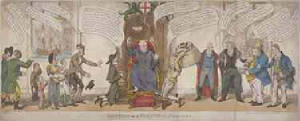
|
|
||
|
George Scholey Lord Mayor of London
|
||
| Home | Clara Novello Scholey | A Brief Family History | Favorite Family Photos | Family Members List Page | George Scholey | Pioneers: The English Years | Scholey of Arizona | Captain Samuel Scholey | Leeds to Australia family | Researching Your Own Family History | Contact Me | Scholey and Schooley Trees | Useful Links | ||
|
George Scholey, Lord Mayor of London 1813
|
||
|
Once again I must offer my thanks to Mr Reg Waites a Scholey descendant who was born in the Old Hall at Ackworth and live
until his sad death in the village for much of the following information The birthplace of George Scholey is in Sandal Magna close to Wakefield at the junction of Manygate Lane and Castle Road.
When he was born there in 1758 the building was a lively and thriving Inn the " Cock and Bottle" and was a halt for coaches
running between Leeds , Sheffield and London . George was the son of John Scholey the Innkeeper. The building has now been
replaced by a group of attractive cottages. Manygates Lane was originally known as Cock & Bottle Lane, in the 1800s murder trials were held within the Inn
itself . An Inn on the site is mentioned in records of both the Royalist v Cromwell civil war but also in the
much earlier civil war: the War of the Roses although it was only given the name The Cock & Bottle in the 1500s.
What is left of the building dates though from the 1600s and not the 1400s so it was clearly rebuilt at some point The lofts contain wonderful oak "A" frames which effectively tie the front & rear walls together. Manygates Lane was the main Leeds to London Road pre @ 1730 when Barnsley Road was originally constructed. There
is evidence that there is every chance the Inn was actually operating as a "coaching inn" as when a neighbour renovated
the end cottage (No. 56) they found the original stable boy's fire place set high in the boundary wall which now
forms part of the kitchen to that property. As Manygates Lane was the main approach to Sandal Castle during the Wars of the Roses and the fact that Richard
Plantagenet 3rd Duke of York (and father of Edward IV and Richard III) was killed locally during the Battle
of Wakefield in December 1460 the memorial to his death ( Grade II listed building 5388 1865 13/190) is situated
some 250m from the Cock & Bottle outside Manygates School. Some consider that the nursery rhyme "The Grand Old Duke of York, He had 10,000 men" etc could have its
origins from Richard and his army leaving Sandal Castle on the 30th December no one really knows. George attended the school (10 boys) which had been endowed in 1686 by a local man Richard Taylor. He was an intelligent boy and as a youth went to work in the old bank at Leeds and from there moved to London and obtained
a post with a firm of hop merchants. He worked hard and prospered . In 1785 (27 years old) he went into partnership with Alderman Sawbridge and in the same year married the daughter of a
member of the Corporation of London. At the start of the Volunteer System he was one of the first to step forward not only
in offering his own personal service but by clothing and engaging every young person of his mercantile concern who was capable
of bearing arms . He became interested in politics and later represented Dowgatein the Court of Aldermen for 34 years. He became Sheriff
in 1804 and Lord Mayor of London in 1812 when he was described as a distiller. For those who do not know, the following is
a description of a recent investiture of a Lord Mayor and will give some idea of the prestige that goes with the role November is the month when with all the historic pomp and ceremony the City of London bestows upon an elected citizen the
high honour of Lord Mayor. We can join the crowds who watch the procession the highlight of which is the Lord Mayor himself
in hs gilded coach and through the television screen we have glimpses of the banquet , the Mansion House and the Guildhall
amd can imagine what the forthcoming year will mwan to the new Lord Mayor of London. On George's Investiture he invited friends from Wakefield to join in the banquet. Alderman Scholey was greatly respected being honest and frugal ----except when called upon to help others --- and had a
high sense of duty. To quote the European Magazine and the London Review of October 1813 " It was to his merit that, regardless
of the resentment of the wealthy he superintended the average price of grain striking a correct balance between corn and bread
to the advantage of the working classes" According to a report in the Wakefield & Halifax Journal of July 1812 " The price of labour had not kept pace with
the price of bread " As the average earnings in 1786 was 3 shillings ( 15pence ) per day this would have purchased quarter
loaves. In 1812 at his highest level labour did not return more than 6 shillings per day ( 30 pence) but that only bought
4 quarter loaves . The rise in the cost of loaves was as follows : 1786 6d ( 2.5 pence) 1792 7.25 d ( 3 pence) 1798 8d ( 3.2pence) 1804 13.25d ( 5.1 pence) 1810 15.5d (7.6pence) 1812 19.75d ( 9pence) One wonders if George had his home in mind for at the time Wakefield was undergoing difficulties. The city was known as
the granary of the west Riding which came by canal even from abroad The huge Corn Market on a Wednesday was the largest in
the north of England and second only to London, however in 1810 because of the Napoleonic wars prices were running high and
there was a scarcity of food for the poor. This was one of the reasons for the Luddite risings . In August 1812 a riotous
assembly mostly of exasperated women gathered outside the Wakefield corn market and prevented the farmers and merchants from
dealing. The Constable was sent for to protect the Cornfactor. Incidents like these were becoming more and more common. There is a caricature of 1813 Showing Alderman Scholey weighing corn and bread out When he retired George lived in a house on Clapham Common for many years till his death in 1839. His friends were surprised
at his will as they thought his estate would be much larger. It seems he had lost money in the bank failures of 1826 but he
still left £120,000 £10,000 had been left to Sandal, half for the benefit of the poor and half for the school. Here are a few contemporary news items referring (inter alia) to George Leeds Mercury, Leeds, Saturday, 28th March, 1812 If you want to see George Scholey's Family Tree, Stephen Kirkman has prepared a comprehensive site and it can
be viewed here Why not join other Scholey & Schooley researchers at http://groups.yahoo.com/group/ScholeyandSchooley/
|
||
|
Enter supporting content here
|

